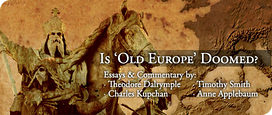To all,
I’m not sure what is meant here by “multiculturalism.” The current American definition of the word—as used in academia for example—is the opposite of the traditional melting pot: multiculturalism means there is no “dominant” culture; there is no one definition of America or American to which all immigrants try to adhere; there is no linguistic or religious or behavioral tradition that we all have in common. If Charles intends to import that idea to Europe, it’s doomed to fail. (I’m not sure it works too well here either, but that’s a completely different matter).
It seems to me that the real difficulty immigrants face in Europe is not racism, or even just the plain old unwelcoming, non-multicultural attitudes of Europeans. It is that the historical national identity of most Europeans is purely ethnic. The definition of a Dane is someone who speaks Danish, grew up eating Danish food, is familiar with Danish fairy tales and has four Danish grandparents. You can’t just tell the Danes they need to scrap all of that old stuff and invent a new identity. To do so would produce a backlash, a cultural vacuum, or both.
The only way immigrants will be absorbed into European countries such as Denmark is the same way they’ve been absorbed for hundreds of years: They must learn Danish, read Danish newspapers, marry Danes, and join Danish political, social, and cultural institutions.
Britain and France are actually exceptions to this, somewhat, because it is possible to be “British” but not “English” or “Scottish,” and because the French have a quasi-universal notion of Francophone culture. Still, the best way to become British is the way generations of, say, British Jews became British: adopt the culture (think of all those Jewish Lords and Ladies). You can’t expect to live a separate life and have separate values and speak a separate language and be accepted as if you were the same. Some European Muslims seem to expect this, however.

